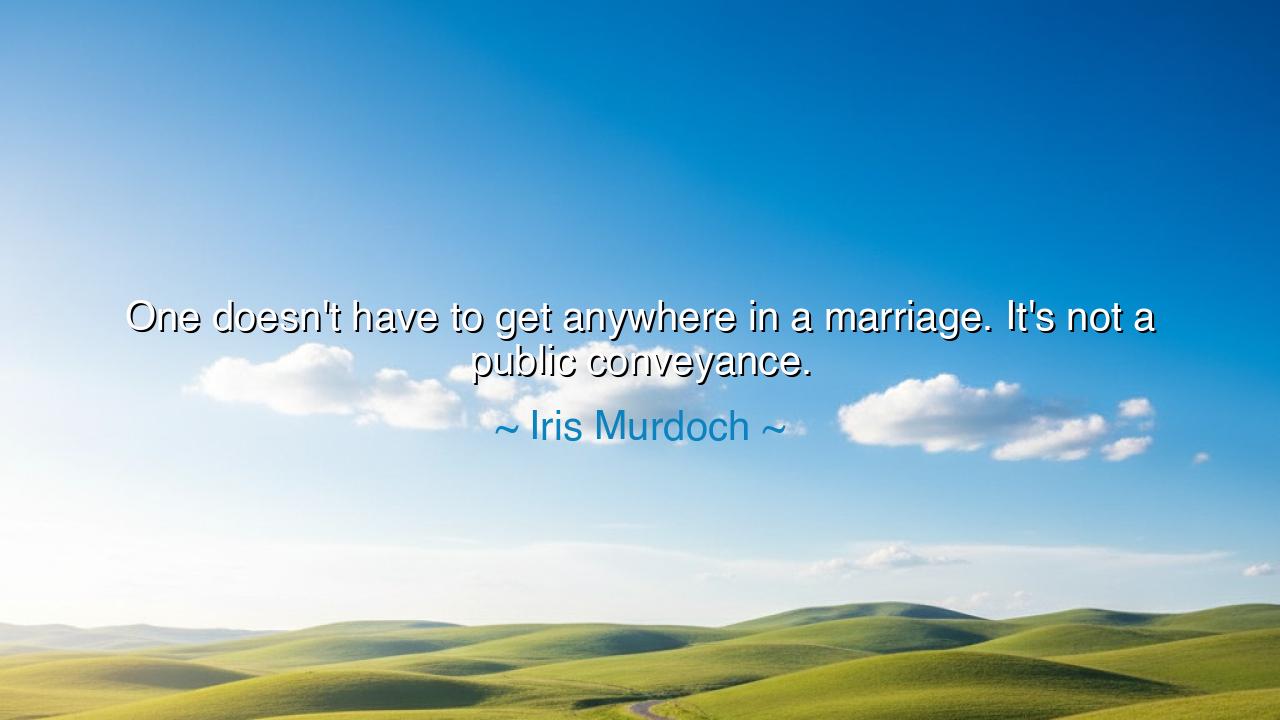
One doesn't have to get anywhere in a marriage. It's not a public






O children of wisdom, hear the words of Iris Murdoch, for they carry within them a truth about the very nature of marriage and the purpose it serves in the lives of those who embark upon its journey: "One doesn't have to get anywhere in a marriage. It's not a public conveyance." These words, though spoken in a modern context, reflect an ancient understanding of union, commitment, and the true nature of relationships. Let us reflect deeply upon this teaching, for it speaks not only to the foundation of marriage, but to the essence of human connection itself.
In the ancient world, marriage was often seen as a social contract, a partnership not solely for the personal happiness of the individuals involved, but for the greater good of the community and the continuation of the family. The Greeks and Romans, for example, viewed marriage not only as a union of love but also as an essential institution for maintaining social order and producing heirs to carry on the family name. To the Romans, marriage was a duty—a partnership in which the individuals played roles for the prosperity of the family and state. It was not about personal fulfillment alone, but about fulfilling a purpose greater than oneself. Yet, even within this framework, there were those, such as the philosopher Aristotle, who understood that love and mutual respect were key to any lasting relationship.
Murdoch’s words, however, challenge this utilitarian view of marriage. She suggests that marriage is not a means to an end, not something in which one is merely “getting somewhere,” but rather a state of being—a union, not a journey with a destination. It is not a public conveyance, a vehicle to be filled with expectations, desires, and demands that must always lead to progress, achievement, or recognition. Instead, marriage is a space where individuals, as partners, exist in the present, in the shared moments of life. It is not a pursuit of end goals but a recognition of the value in simply being together, living together, and learning together.
Consider the ancient story of Odysseus and his wife Penelope. Their marriage was not built on the expectation of constant progression or public displays of affection. Penelope, left for twenty years by Odysseus, remained faithful and committed to the idea of union, not because it was a public duty, but because of the deep love and trust they shared. She did not measure her life or their marriage by any external markers of success or achievement, but by the quiet strength of knowing that their bond was deeper than mere circumstance. Odysseus, too, returned not because he had a destination in mind, but because his soul found peace in the thought of reunion—not as a means to an end, but as a fulfillment of a shared life.
Murdoch’s wisdom reveals a deeper truth about the nature of love: marriage is not about reaching a destination, nor is it about filling a role in society or fulfilling societal expectations. It is about the shared journey of two souls living in harmony, not driven by the need to “get somewhere,” but guided by the quiet force of connection, companionship, and mutual respect. In our modern world, marriage often becomes entangled with goals—financial success, career achievements, public image—but Murdoch reminds us that marriage should not be another task or public conveyance to be ridden toward a specific goal. It should be, rather, a peaceful state of being, a place where two people are free to explore the depths of love and life without the pressure of progression.
The lesson here is profound: marriage is not a tool for advancement or achievement; it is a union where the very act of sharing life together is the goal. It is not about seeking something external, but about finding meaning in the relationship itself. The wisdom of the ancients teaches us that true harmony and growth come not from the constant striving to get somewhere, but from the willingness to be present, to enjoy the quiet moments together, and to respect the space of the other. The strength of a marriage lies not in what is achieved or what is expected, but in the simple act of being together in love and trust.
So, O seekers of wisdom, what can we do in our own lives to embrace this truth? We must recognize that the value of marriage lies not in societal achievements or public recognition but in the quality of our connection with our partner. We must not see it as a destination to reach or a role to fulfill, but as a space to live together, to grow together, and to support one another in the quiet moments of life. Let us not measure our relationships by external markers of success, but by the depth of our companionship, the honesty of our communication, and the strength of our mutual respect. Marriage is not a race to be won; it is a journey to be shared.
Let us walk forward with the understanding that love and marriage are not about progress or external goals, but about creating a life of presence and connection. May we embrace the gift of being together with those we love, knowing that the beauty of union lies not in what we seek to achieve, but in the love we cultivate every day. Let marriage be a journey without destination, one filled with quiet joys, shared moments, and the timeless beauty of love freely given and gently received.






AAdministratorAdministrator
Welcome, honored guests. Please leave a comment, we will respond soon